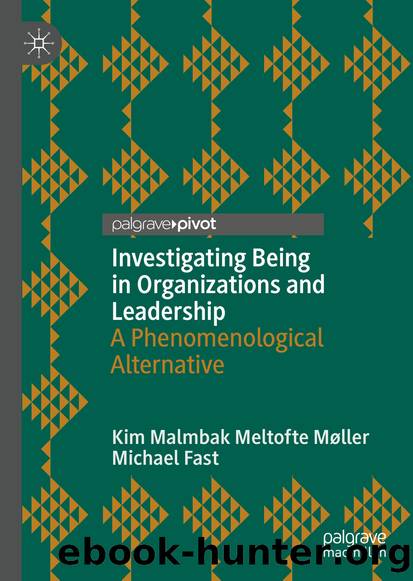Investigating Being in Organizations and Leadership by Kim Malmbak Meltofte Møller & Michael Fast

Author:Kim Malmbak Meltofte Møller & Michael Fast
Language: eng
Format: epub
ISBN: 9783030581381
Publisher: Springer International Publishing
The Dialectic of Being
Central in the human being as situated in organizations and social contexts is handling contradictions of everyday life and the reality that confronts the subject and subjects. At the same time this process of trying to understand and create meaning from reality is itself dialectical (e.g. Kantâs discussion of cognition) and is based on solving the contradictions in our knowing and making sense of situations, things and others. This also relates to what we are discussing in relation to social interaction and the creation of intersubjectivity.
On one hand, the subject is situated with its here and now in everyday lifeâit is the a priori and is the premise for life and being. We know from our everyday life it is something we have met and that we also take for granted, in general. All of this is grounded in the way our consciousness works, as it is necessary in order to be and to be social beings with others, and to be able to have common activities and common understanding as it arises and is created in this everyday life. The basis for this ability to have something in common is the intersubjectivity in the social origin of knowledge or social inheritance. The dialectic in this lies in the interaction with others and in the subjectâs ability to transcend the social to become an experience of the subject.
In an intersubjective consciousness (a consciousness about something, not everything), the concept of typification is important as it is the ability to arrange a situation or an object in such a way that it becomes part of a socially important category of situations and objects. People acting toward each other having common typifications are thus enabled to structure their worlds of experiences so that they look alike, through the common meanings created that they lay down on the specific fields of experience important to them. The process of understanding the behavior of others may be understood as a process of typification, where the actors use interpretive structures to understand the object of the actions of other people. These structures come from the experiences of everyday lifeââthe stock of knowledgeâ or the âcommonsenseââas an understanding lying in the natural attitude of life. It is through the use of typification that we classify and organize our everyday life reality.
Typification can be understood as a two-pronged process: on one hand, it solidifies some aspects of reality into an incorrigible, self-evident field of âun-problemsâ; on the other hand, it draws the line that renders everything left on the other side potentially problematic. That is to say, the process of typification determines, by the same token, what is to be determined and what is to remain indeterminate. The stock of information includes the knowledge that other people like us exist in the world and that their conduct has the same structure which we âknowâ from the experiences of our own acting in everyday life. This knowledge renders other people potential partners in communication when viewed
Download
This site does not store any files on its server. We only index and link to content provided by other sites. Please contact the content providers to delete copyright contents if any and email us, we'll remove relevant links or contents immediately.
Time Management Made Easy: How to Cultivate New Habits, Improve Productivity and Get Things Done by Joshua Strachan(2406)
The 7 Habits of Highly Effective People by Stephen R. Covey & Sean Covey(2256)
The Concise Laws of Human Nature by Robert Greene(1900)
Doesn't Hurt to Ask by Trey Gowdy(1634)
Primal Leadership by Daniel Goleman(1273)
Hook Point: How to Stand Out in a 3-Second World by Brendan Kane(1233)
Don't Sweat the Small Stuff...and It's All Small Stuff by Richard Carlson(1115)
HBR's 10 Must Reads 2021 by unknow(1094)
The Power of 100! by Shaun King(1066)
Amazon Unbound by Brad Stone(1040)
100 Things Successful People Do by Nigel Cumberland(1026)
HBR's 10 Must Reads 2021 by Harvard Business Review(1003)
Master of One by Jordan Raynor(1002)
The Job Closer by Steve Dalton(993)
Lives of the Stoics by Ryan Holiday & Stephen Hanselman(965)
Declutter Your Mind: A step by step guide to learn to control your thoughts, stop worrying, relieve anxiety and eliminate panic attacks and negative thinking by Mia Chandler(961)
The Book of Hope by Jane Goodall(867)
Conflicted by Ian Leslie(864)
Coders at Work: Reflections on the craft of programming by Peter Seibel(844)
